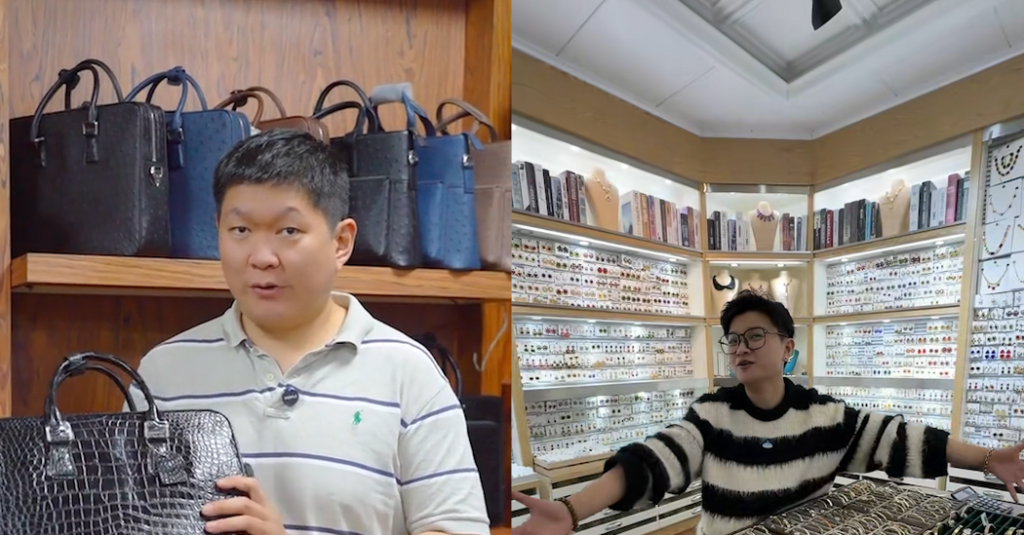Chinese manufacturers are increasingly targeting American consumers through TikTok and other social media platforms, encouraging them to purchase luxury goods directly from their factories. With rising tariffs on Chinese imports, many Americans are showing enthusiasm for these offers.
The promotional content suggests that shoppers can find leggings and handbags similar to those from brands like Lululemon, Hermes, and Birkenstock, but at significantly lower prices. Often, these claims are misleading, suggesting that the items are produced in the same facilities as the name-brand items.
American influencers have jumped on board, sharing videos that highlight the factories and driving traffic to Chinese shopping platforms such as DHGate and Taobao, particularly as fears grow over increased prices due to Trump’s tariffs on Chinese goods. Last week, DHGate was among the top ten most downloaded apps in both Apple’s and Google’s stores.
These videos are becoming highly popular on TikTok and Instagram, accumulating millions of views and many likes. Some comments indicate a shift in sentiment towards China, with remarks like “Trump picked the wrong country to take on” and “China has come out on top in this conflict.”
The videos provide a unique platform for Chinese factory owners and workers to communicate directly with American shoppers, despite social media being technically prohibited in China. This surge in popularity underscores a growing pro-China sentiment among American social media users, reminiscent of the backlash against potential TikTok bans by the federal government.
“This is engaging people politically, much like the uproar over possible TikTok cancellations, but now in the context of tariffs and the broader relationship between the countries,” explained Matt Pearl, a director at the Center for Strategic and International Studies who specializes in technology issues. “This shows their capability to reach American consumers and convey messages about our reliance on Chinese products.”
According to Mr. Pearl, it’s possible that the Chinese government is allowing these videos to spread, considering its usual stance against its citizens sharing content that infringes on Western trademarks.
The Chinese Embassy in Washington and the Consulate in New York did not respond to requests for comment.
The number of TikTok videos encouraging direct purchases from Chinese factories increased by nearly 250 percent during the week of April 13, as reported by Margot Hardy, an analyst from Graphika. The hashtag #ChineseFactory had 29,500 posts on TikTok as of April 23, and 27,300 on Instagram.
Experts in retail and vendors in China express skepticism about the authenticity of the most viral videos claiming to represent manufacturers of brands like Lululemon and Hermes. These factories typically have strict non-disclosure agreements and are unlikely to jeopardize long-term partnerships with major brands for a few direct sales, according to Sucharita Kodali, a retail expert at Forrester.
Ms. Kodali noted that the Chinese government seems to be permitting the dissemination of these videos.
“The interests of brands like Lululemon or Chanel likely aren’t even on the radar of the Chinese trade minister and officials,” she remarked. Manufacturers might also be hurrying to finalize sales before impending tariffs on May 2 impose hefty costs on shipments from China.
Nonetheless, doubts about the legitimacy of these products haven’t diminished consumer interest.
Elizabeth Henzie, a 23-year-old from Mooresville, N.C., expressed surprise at the production costs and retail prices advertised in these videos. She created a spreadsheet of factories claiming to sell replicas of sneakers, luxury bags, and more, and shared it on her TikTok profile, attracting over one million views.
Ms. Henzie is now an affiliate partner with DHGate, where she will receive free products for her reviews and earn commissions on sales made through her links. She believes that people in China genuinely want to assist Americans.
“Having support from other countries trying to assist American consumers has lifted my spirits,” she shared. “Despite the negative circumstances in America, it seems to encourage unity.”
TikTok, owned by the Chinese company ByteDance, has been removing some videos, citing a policy against promoting counterfeit goods. However, many have survived through reposts. Even older videos about Chinese manufacturing are circulating widely amid heightened interest in tariffs. TikTok chose not to comment further, and Instagram, under Meta, also declined to address the situation.
Chinese sellers reported they began posting videos in response to declining sales. Yu Qiule, a 36-year-old co-owner of a manufacturing firm in Shandong Province that produces fitness equipment, started sharing on TikTok in mid-March as tariffs led to a spike in canceled orders.
Louis Lv, the export manager at Hongye Jewelry Factory in Yiwu, Zhejiang Province, mentioned that his company began uploading content to TikTok late in 2024 due to a downturn in domestic sales.
He has observed a significant rise in views for his TikTok videos since the Trump administration imposed tariffs. “Chinese businesspeople believe in pursuing opportunities wherever they arise,” he stated in an interview.
In a highly shared TikTok video, a man claims to hold a Hermes Birkin bag while discussing its production costs from a factory. (The original content has been removed, but various versions are still circulating.) He claims the bag costs under $1,400 to make, while the luxury retailer sells it for $38,000, primarily for its brand name. He offers to sell a similar bag for $1,000 using the same materials without the logo.
A representative from Hermes affirmed that its bags are “entirely made in France” and refrained from further comment. A spokesperson for Birkenstock stated that the videos depict “knockoffs” and that their footwear is designed and produced in the EU. They mentioned contacting TikTok, which removed initial videos on April 15.
Lululemon, targeted by TikTok videos claiming to offer its leggings for just $5, confirmed it has reached out to TikTok to eliminate misleading claims. Lululemon emphasized in a statement that they do not collaborate with the manufacturers featured in these videos and warned consumers about potential counterfeit goods and misinformation.
Vanessa Friedman and Isabelle Qian contributed reporting from New York.


